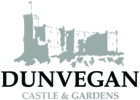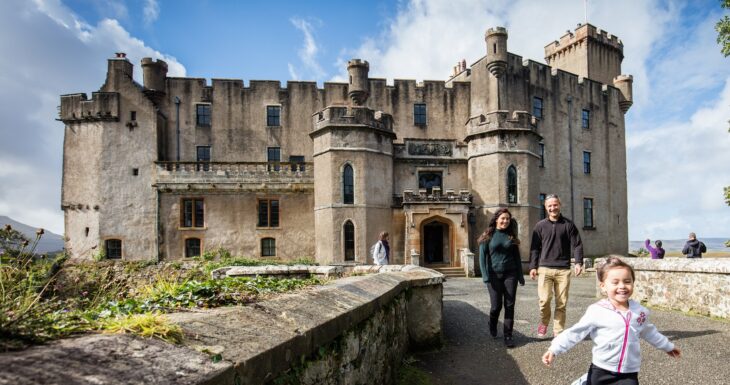
Dunvegan Castle & Gardens
A hidden oasis of gardens around this medieval fortress and mansion.
Dunvegan, Isle of Skye, IV55 8WF

Committed to providing an accessible attraction, Dunvegan Castle & Gardens strives to ensure that visitors with disabilities can enjoy as much of the MacLeod Estate as possible.
We warmly welcome visitors with physical, sensory and learning disabilities. We recognise that some areas of Dunvegan Castle & Gardens may present difficulties for people with disabilities. We are continually reviewing our procedures to make access improvements wherever possible to ensure that our visitors have a safe and enjoyable day out.
WHEELCHAIR & LIMITED MOBILITY
Although there is level access to the castle gardens from dedicated parking bays in the castle car park opposite the main gate Ticket Office, some sections of the garden path network are steep in places due to the nature of the terrain itself. Steps on these moderately steep sections were not installed in order to facilitate wheelchair access, and more accessible paths connecting the three formal garden areas have been put in place in order to resolve previous access issues in other areas.
The castle’s entrance hall is accessible with assistance via a ramp (6 steps) and more limited access to the 1st floor (12 steps). Access to the 1st floor is not encouraged, but it may be possible depending on the nature of the visitors’ disability and visitor numbers at the time. When a visitor is unable to access the castle, an armchair visit can be provided by one of the castle guides who will arrange to screen the castle video on a portable electronic device in the flower room or outside on the land bridge weather permitting. Unfortunately, powered wheelchairs cannot be accommodated inside the castle.
HEARING IMPAIRED
Visitors should be encouraged to self-identify on entry. In our video room, subtitles are shown on the video. Information cards in various languages are available in all the state rooms.
VISION IMPAIRED
Visitors should be encouraged to self-identify on entry. Braille information is currently unavailable.
PETS – DOGS
Registered assistance dogs are permitted in all public areas of the castle. Dogs are permitted in the castle gardens, but they must be kept on a lead at all times. Dog owners must ensure they clean up after their dog. A dog drinking bowl is located outside the MacLeod Tables Cafe in the car park.
INFANTS & SMALL CHILDREN
As part of our family ticket offering, there is a special castle key hunt and lots of activities for children to enjoy in the gardens including our popular Wild Wood Trail and the rotating ‘Dunvegan Pebble’ sculpture in the Walled Garden. The seal trips are not to be missed, and they are free for children under 5yrs. Please ask a member of staff about the family workshops and activities during the school holidays, such as our annual Easter Egg hunt.
Please note that for safety reasons, pushchairs and baby backpack carriers are not permitted inside the castle. They must be left and reclaimed at the main entrance. Parents carrying infants should take extra care when entering the Dungeon and Medieval Kitchen due to low ceiling heights.
Baby changing facilities are available in the car park and cafe. All children under the age of 12 must be supervised by an adult at all times.
Sir Reginald MacLeod (27th Chief) was the first Chief to open Dunvegan to the public in 1933 for charitable purposes two days a week. Since then, the number of visitors has risen from a few hundred to hundreds of thousands. Despite such numbers crowding into a space that was designed to keep people out, we do everything we can to maintain this atmosphere of a family home while sharing our passion for Dunvegan’s historic collection with you. Your support is greatly appreciated. It will help us to preserve, develop and share this iconic part of Scotland’s heritage for future generations to enjoy.
On display are many fine oil paintings and clan treasures, the most famous of which is the Fairy Flag. Legend has it that this sacred banner has miraculous powers and when unfurled in battle, the clan MacLeod would invariably defeat their enemies. Another of the castle’s great treasures is the Dunvegan Cup, a unique ‘mazer’ dating back to the Middle Ages. It was gifted by the O’Neils of Ulster as a token of thanks to one of our most celebrated Chiefs, Sir Rory Mor, for his support of their cause against the marauding forces of Queen Elizabeth I of England in 1595. We also have a small collection of Jacobite and Bonnie Prince Charlie relics on display including the Prince’s waistcoat and a lock of his hair, a Jacobite amen glass, Flora MacDonald’s corset and pin cushion etc.
Dunvegan Castle’s five acres of formal gardens began life in the 18th century. In stark contrast to the barren moorland and mountains that dominate Skye’s landscape, the gardens are a hidden oasis featuring an eclectic mix of plants. As you make your way through woodland glades, you’ll pass shimmering pools fed by waterfalls and streams flowing down to the sea. After experiencing the Water Garden with its ornate bridges and islands replete with a rich and colourful plant variety, wander through the elegant surroundings of the formal Round Garden featuring an ilex crenata parterre as its centrepiece overlooked by a Monkey Puzzle (Araucaria araucana). The Walled Garden is well worth a visit: in what was formerly the castle’s vegetable garden is now a diverse range of plants and flowers that complement the attractive features including a water lily pond, garden museum, memorial gazebo, 17th century lectern sundial, larch pergola, glass House and the ‘Dunvegan Pebble’, a rotating 2.7 ton Carrara marble sculpture. There is also a herbal border and traditional raised vegetable beds to illustrate the Walled Garden’s original function to provide food for the Chief, his family and clansfolk.
A considerable amount of investment in new planting schemes, design features and landscaping works has been made to restore the gardens to their former glory. This Herculean effort was recognised when Dunvegan Castle & Gardens was made a Royal Horticultural Society (RHS) Partner Garden in 2022. Being accepted into this horticultural pantheon is a glowing testament to the creative vision and funding that has been bestowed upon Dunvegan Castle’s five acres of formal and semi-formal gardens since 1976, when the late John MacLeod (29th Chief of Clan MacLeod) decided to follow the example of his ancestors who had tried to create a garden at Dunvegan.
Over the centuries, we have given a warm Highland welcome to visitors including Sir Walter Scott, Dr Johnson, HM Queen Elizabeth II, HRH The Prince of Wales and Crown Prince Naruhito of Japan. We look forward to welcoming you.
Committed to providing an accessible attraction, Dunvegan Castle & Gardens strives to ensure that visitors with disabilities can enjoy as much of the MacLeod Estate as possible.
We warmly welcome visitors with physical, sensory and learning disabilities. We recognise that some areas of Dunvegan Castle & Gardens may present difficulties for people with disabilities. We are continually reviewing our procedures to make access improvements wherever possible to ensure that our visitors have a safe and enjoyable day out.
WHEELCHAIR & LIMITED MOBILITY
Although there is level access to the castle gardens from dedicated parking bays in the castle car park opposite the main gate Ticket Office, some sections of the garden path network are steep in places due to the nature of the terrain itself. Steps on these moderately steep sections were not installed in order to facilitate wheelchair access, and more accessible paths connecting the three formal garden areas have been put in place in order to resolve previous access issues in other areas.
The castle’s entrance hall is accessible with assistance via a ramp (6 steps) and more limited access to the 1st floor (12 steps). Access to the 1st floor is not encouraged, but it may be possible depending on the nature of the visitors’ disability and visitor numbers at the time. When a visitor is unable to access the castle, an armchair visit can be provided by one of the castle guides who will arrange to screen the castle video on a portable electronic device in the flower room or outside on the land bridge weather permitting. Unfortunately, powered wheelchairs cannot be accommodated inside the castle.
HEARING IMPAIRED
Visitors should be encouraged to self-identify on entry. In our video room, subtitles are shown on the video. Information cards in various languages are available in all the state rooms.
VISION IMPAIRED
Visitors should be encouraged to self-identify on entry. Braille information is currently unavailable.
PETS – DOGS
Registered assistance dogs are permitted in all public areas of the castle. Dogs are permitted in the castle gardens, but they must be kept on a lead at all times. Dog owners must ensure they clean up after their dog. A dog drinking bowl is located outside the MacLeod Tables Cafe in the car park.
INFANTS & SMALL CHILDREN
As part of our family ticket offering, there is a special castle key hunt and lots of activities for children to enjoy in the gardens including our popular Wild Wood Trail and the rotating ‘Dunvegan Pebble’ sculpture in the Walled Garden. The seal trips are not to be missed, and they are free for children under 5yrs. Please ask a member of staff about the family workshops and activities during the school holidays, such as our annual Easter Egg hunt.
Please note that for safety reasons, pushchairs and baby backpack carriers are not permitted inside the castle. They must be left and reclaimed at the main entrance. Parents carrying infants should take extra care when entering the Dungeon and Medieval Kitchen due to low ceiling heights.
Baby changing facilities are available in the car park and cafe. All children under the age of 12 must be supervised by an adult at all times.
